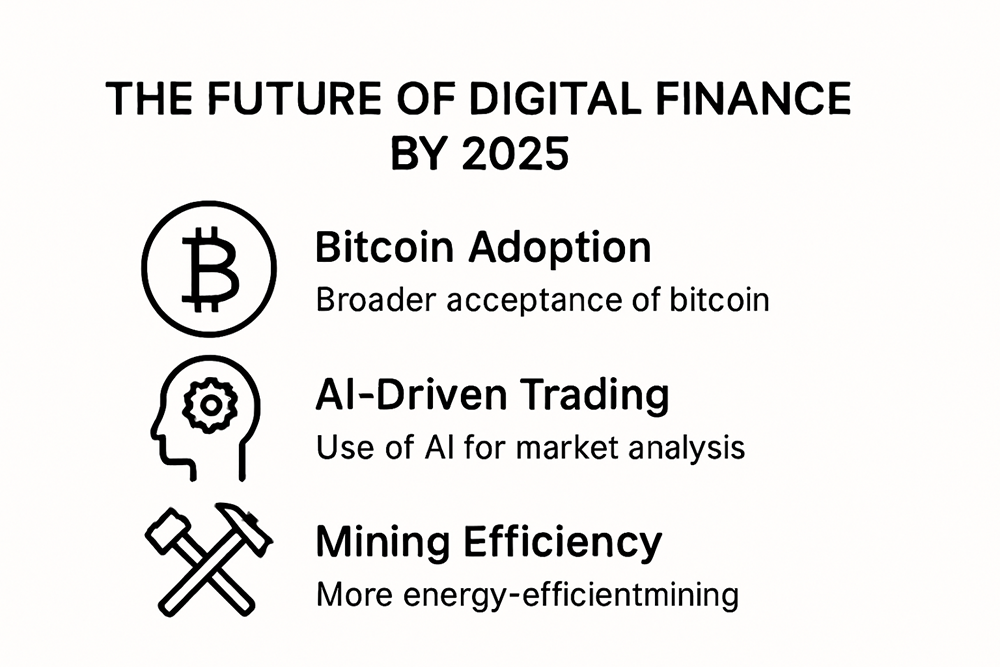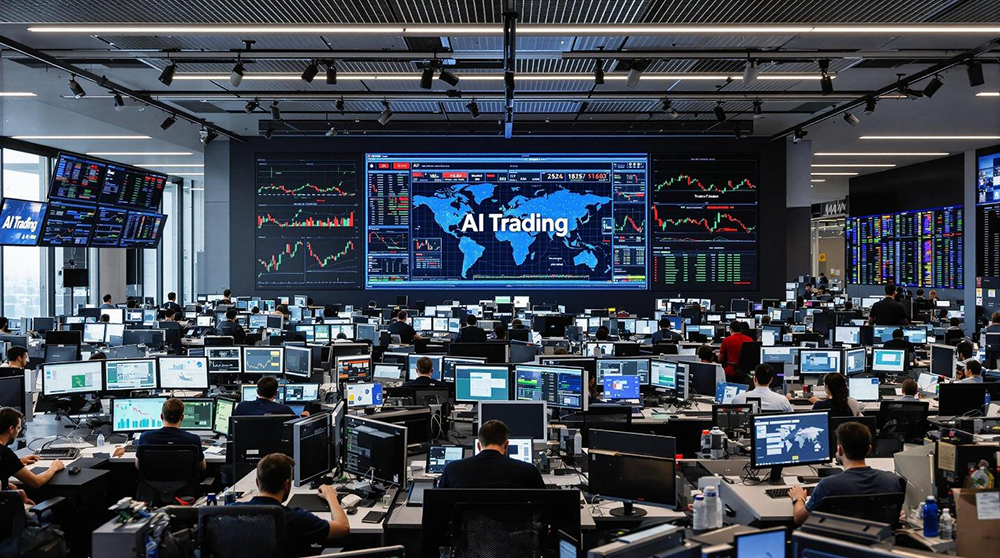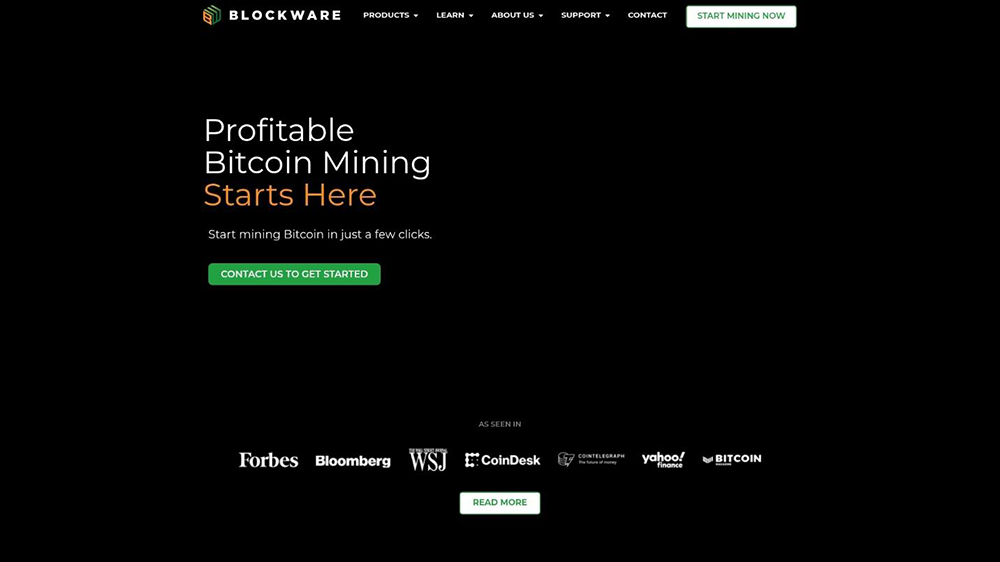
Bitcoin and artificial intelligence are rewriting the rules of digital finance. By 2025, tokenization of real-world assets is projected to explode to $16 trillion, with AI-driven trading now making up 70 percent of major market activity. It sounds like the wild future everyone predicted. Think again. The most surprising twist is that digital assets are no longer on the fringe—they are becoming the backbone of a connected, transparent global market that challenges old ideas about value, ownership, and opportunity.
| Takeaway | Explanation |
|---|---|
| Institutional Adoption of Bitcoin is Increasing | By 2025, Bitcoin’s integration with traditional financial markets is evident, with significant correlation levels rising to 0.87 with major U.S. equity indices, marking its evolution from a speculative asset to a legitimate financial instrument. |
| AI is Transforming Trading Strategies | AI and machine learning are enhancing trading efficiency and predictive accuracy, allowing for the analysis of vast datasets and execution of trades in milliseconds, fundamentally changing financial decision-making processes. |
| Emergence of Asset Tokenization | By 2025, tokenization of real-world assets is projected to reach $16 trillion, allowing fractional ownership and democratizing access to previously illiquid investment opportunities through blockchain technology. |
| HPC Enhances Bitcoin Mining Efficiency | High-Performance Computing (HPC) is revolutionizing Bitcoin mining by optimizing computational performance and energy consumption, which are critical for the sustainability of cryptocurrency operations. |
| Interconnectedness of Digital Assets and Traditional Markets | As correlations between Bitcoin and traditional equities increase, digital assets are becoming integral to diversified investment strategies, reflecting a transition towards a more adaptive financial ecosystem. |

The future of digital finance is rapidly transforming, with Bitcoin and cryptocurrency positioned to redefine financial infrastructure by 2025. Institutional adoption and technological advancements are driving unprecedented changes in how we perceive and interact with digital assets.
By 2025, Bitcoin has transcended its initial perception as a speculative asset. Research from academic studies reveals a remarkable correlation between Bitcoin and traditional financial markets, with correlation levels reaching 0.87 with major U.S. equity indices like the Nasdaq 100 and S&P 500. This integration signals a profound shift in Bitcoin’s economic positioning.
The United States government has taken significant steps toward legitimizing Bitcoin, establishing a Strategic Bitcoin Reserve in March 2025. By capitalizing on approximately 200,000 BTC already in federal possession, the government demonstrates a strategic acknowledgment of Bitcoin’s potential as a national financial asset.
As of 2025, Bitcoin has reached a critical milestone with over 95% of its total supply mined. More than 19.9 million BTC are now in circulation, solidifying its status as “digital gold” and an attractive hedge against inflation. Our comprehensive research publications provide deeper insights into these evolutionary trends.
The cryptocurrency ecosystem is experiencing unprecedented maturation. Advanced blockchain technologies are enabling more secure, transparent, and efficient financial transactions. Smart contract capabilities, improved scalability, and enhanced privacy protocols are transforming how digital assets are created, traded, and managed.
Cryptocurrencies are no longer operating at the margins of the financial world. Major financial institutions, central banks, and governments are developing robust frameworks to integrate digital assets into mainstream economic systems. Regulatory clarity, improved infrastructure, and advanced trading platforms are making cryptocurrency more accessible and attractive to institutional and retail investors.
The convergence of artificial intelligence, blockchain technology, and advanced computational methods is creating a new paradigm in digital finance. Investors and financial professionals are recognizing cryptocurrencies not just as speculative instruments, but as legitimate components of diversified investment portfolios.
As we move through 2025, the future of digital finance is being written by innovative technologies, forward-thinking institutions, and a global community increasingly embracing decentralized financial systems. Bitcoin and cryptocurrencies are no longer alternative investments but emerging cornerstones of a more interconnected, efficient, and transparent global financial infrastructure.
To help clarify the maturation and adoption trends for Bitcoin by 2025 as discussed above, the following table summarizes key milestones and statistics.
| Aspect | Statistic/Fact | Year/Level |
|---|---|---|
| BTC Supply Mined | Over 95% | As of 2025 |
| BTC in Circulation | More than 19.9 million | As of 2025 |
| US Government BTC Holdings | ~200,000 BTC in reserve | 2025 |
| Strategic Bitcoin Reserve (US) | Established | March 2025 |
| BTC Correlation with US Equities | 0.87 (Nasdaq 100, S&P 500) | By 2025 |
Artificial Intelligence is fundamentally transforming financial markets, creating unprecedented opportunities for sophisticated trading strategies, risk management, and investment decision making. The integration of advanced machine learning algorithms and computational techniques is reshaping how financial institutions analyze data, predict market movements, and execute complex trading operations.
Cutting-edge research reveals that AI applications are revolutionizing trading strategies by enabling more intricate and profitable algorithmic approaches. Machine learning methods like neural networks and deep learning are empowering traders to develop sophisticated predictive models that can process vast amounts of market data with remarkable speed and accuracy.
Trading algorithms powered by AI can now analyze multiple data streams simultaneously, including real-time market trends, social media sentiment, economic indicators, and historical price movements. These advanced systems can identify complex patterns and potential market opportunities that traditional human analysis might overlook. Research from academic studies demonstrates that AI-integrated algorithmic trading systems significantly enhance predictive accuracy and overall market efficiency.

AI is transforming risk management in financial institutions by providing unprecedented insights into potential market volatilities and systemic risks. Machine learning models can now simulate thousands of potential economic scenarios, helping institutions develop more robust risk mitigation strategies.
Comprehensive AI research highlights the transformative potential of artificial intelligence in the financial sector while also identifying critical challenges. These challenges include ensuring transparency, maintaining interpretability of complex AI models, and managing potential systemic risks associated with automated trading systems.
As AI becomes increasingly integrated into financial systems, developing comprehensive regulatory frameworks becomes paramount. Financial institutions and regulators must collaborate to establish guidelines that balance technological innovation with systemic stability. This involves creating mechanisms to monitor AI trading algorithms, ensuring they operate within predefined ethical and legal boundaries.
Our research publications explore the intricate relationship between advanced computational technologies and financial markets. The future of trading will depend not just on technological capabilities, but on our ability to implement intelligent, responsible AI systems that enhance market efficiency while protecting investor interests.
The convergence of artificial intelligence, computational power, and financial expertise is creating a new paradigm in trading and investment strategies. As machine learning algorithms become more sophisticated, they will continue to unlock new possibilities for understanding and navigating complex financial ecosystems, fundamentally reshaping how we approach investment and risk management.
High-Performance Computing (HPC) is revolutionizing Bitcoin mining by introducing unprecedented levels of computational efficiency, security, and technological innovation. As the digital finance landscape becomes increasingly complex, advanced computational techniques are transforming how miners approach blockchain validation and cryptocurrency generation.
Research from the U.S. Department of Energy underscores the critical role of HPC in solving complex computational challenges. In Bitcoin mining, this translates to developing more sophisticated algorithms and hardware configurations that maximize computational output while minimizing energy consumption.
Cutting-edge technological approaches are emerging to address traditional mining limitations. Innovative research exploring superconducting circuits based on Josephson Junctions demonstrates potential breakthroughs in device performance. These advanced circuits offer picosecond latencies and significantly lower switching energy compared to conventional CMOS technologies, presenting a promising avenue for more efficient Bitcoin mining infrastructure.
Security remains a paramount concern in cryptocurrency mining ecosystems. Advanced cryptography research has developed sophisticated methods for detecting covert cryptomining activities. By utilizing Hardware Performance Counters (HPC), researchers can create unique signatures that capture the distinctive execution patterns of mining algorithms, enhancing overall system security and preventing unauthorized mining attempts.
The integration of machine learning and high-performance computing enables more robust threat detection mechanisms. These systems can rapidly identify anomalous mining activities, protecting both individual miners and large-scale mining operations from potential security breaches.
The convergence of HPC, artificial intelligence, and blockchain technologies is creating a new paradigm for cryptocurrency mining. Miners are no longer limited by traditional computational constraints but can leverage advanced technological ecosystems that optimize performance, reduce energy consumption, and enhance security.
Our comprehensive research publications explore the intricate relationship between advanced computational technologies and cryptocurrency mining strategies. The future of Bitcoin mining will be characterized by increasingly sophisticated computational approaches that balance technological efficiency with environmental sustainability.
As blockchain technologies continue to evolve, HPC will play an increasingly critical role in shaping the infrastructure of digital finance. By pushing the boundaries of computational performance and security, miners and researchers are developing more intelligent, efficient, and resilient systems that can meet the growing demands of the cryptocurrency ecosystem.
The digital era is fundamentally reshaping stock markets, driving unprecedented transformations through technological innovation, artificial intelligence, and decentralized financial technologies. Traditional investment paradigms are giving way to more dynamic, data-driven, and accessible financial ecosystems.
Emerging research reveals a stunning transformation in trading mechanisms, with AI-driven algorithms now commanding approximately 70% of trading volume across major exchanges. This shift represents a profound evolution from human-centric trading toward sophisticated, data-driven decision-making processes.
Artificial intelligence enables traders and institutional investors to process massive datasets with unprecedented speed and accuracy. Machine learning algorithms can now analyze complex market patterns, predict potential market movements, and execute trades in milliseconds. These technologies are not just enhancing trading efficiency but fundamentally reimagining how financial strategies are developed and implemented.
Groundbreaking research projects the tokenization of real-world assets to reach an extraordinary $16 trillion by 2025. This revolutionary approach enables fractional ownership and creates liquid markets for traditionally illiquid assets, democratizing investment opportunities across global financial systems.
Blockchain technology facilitates these transformations by providing transparent, secure, and efficient mechanisms for asset representation and transfer. Investors can now purchase fractional shares of real estate, artwork, commodities, and other high-value assets that were previously accessible only to institutional or ultra-high-net-worth individuals.
Academic studies highlight a significant trend of increased correlation between Bitcoin and traditional equity markets. With correlation levels reaching 0.87 with major U.S. equity indices, digital assets are no longer viewed as speculative instruments but are increasingly recognized as integral components of sophisticated investment portfolios. Our research publications delve deeper into these complex market dynamics. The convergence of traditional financial instruments with digital assets is creating a more interconnected, fluid, and adaptable financial ecosystem.
As technological innovations continue to accelerate, stock markets are transitioning from rigid, centralized systems to flexible, intelligent platforms that leverage artificial intelligence, blockchain technologies, and advanced computational methods. These transformations promise more transparent, accessible, and efficient financial markets that can adapt rapidly to global economic changes, ultimately benefiting investors, traders, and economic systems worldwide.
To illustrate key digital finance shifts in 2025 across technology and markets, the following summary table contrasts major innovations and their projected impact or adoption.
| Innovation | Key Statistic/Fact | Impact/Scope |
|---|---|---|
| AI-Driven Trading | 70% of volume on major exchanges | Efficiency & automation |
| Asset Tokenization | $16 trillion market size by 2025 | Democratized access |
| Fractional Ownership | Liquid markets for illiquid assets | Investment accessibility |
| BTC-Equity Market Correlation | 0.87 with major U.S. indices (Nasdaq 100, S&P 500) | Integration with trad. finance |
| U.S. Strategic BTC Reserve | ~200,000 BTC held, reserve launched March 2025 | Institutional legitimization |
By 2025, Bitcoin is expected to become more integrated with traditional financial markets, with a correlation level of 0.87 with major U.S. equity indices, transforming from a speculative asset to a legitimate financial instrument.
Artificial intelligence is enhancing trading efficiency and predictive accuracy, enabling the analysis of vast datasets and execution of trades at unprecedented speeds, fundamentally transforming financial decision-making.
Asset tokenization refers to the process of converting real-world assets into digital tokens on a blockchain. By 2025, this market is projected to reach $16 trillion, allowing for fractional ownership and democratizing access to various investment opportunities.
High-Performance Computing (HPC) is optimizing computational performance and energy efficiency in Bitcoin mining, allowing for more sophisticated algorithms and hardware configurations to enhance security and environmental sustainability.
The era of digital assets is no longer a prediction. According to our article, Bitcoin’s integration with traditional finance and the rising power of AI are transforming investment and mining. But with this rapid evolution comes new challenges. Investors, traders, and miners are faced with navigating asset tokenization, ensuring high computational efficiency, and securing consistent returns in a volatile environment. If you want a smarter and simpler way to thrive as the digital market matures, you do not have to face it alone.

Break through the uncertainty with Blockware Solutions. From effortless hosted Bitcoin mining and instant hardware ROI insights to full concierge support and expert Bitcoin Mining Made Easy, our Mining-as-a-Service approach gives you every tool you need. Seize control of your future in digital finance now. Visit Blockware Solutions to get started instantly.